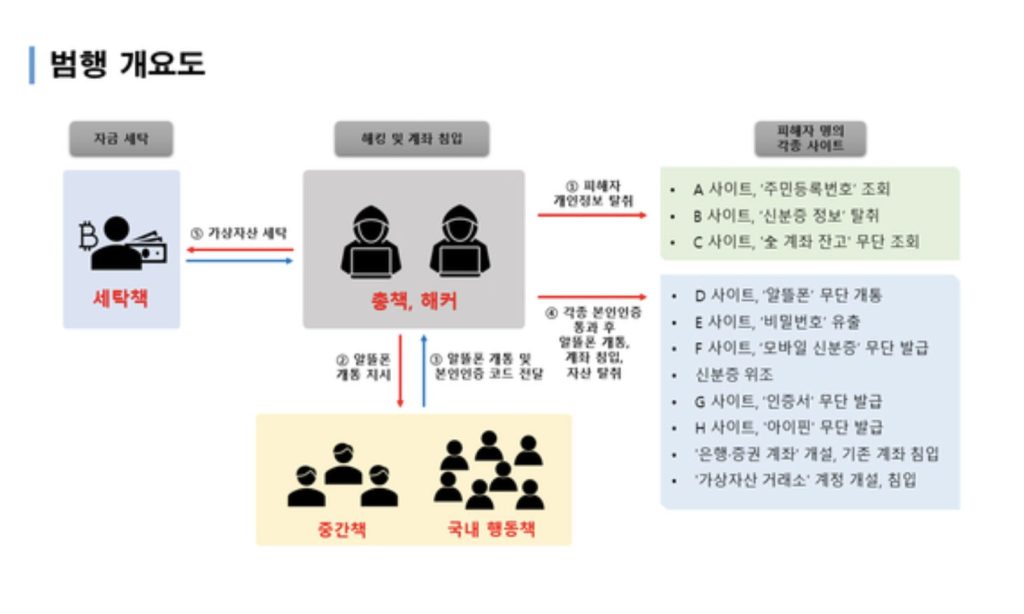
South Korean police have dismantled an international hacking ring accused of stealing nearly 39 billion won ($28.1 million) from some of the country’s wealthiest and most high-profile figures, including BTS member Jungkook.
The Seoul Metropolitan Police Agency’s Cyber Investigation Unit announced on the 28th that 16 suspects had been arrested, among them two ringleaders identified only as Mr. A (35) and Mr. B (40).
Three of the suspects remain in custody, while others face prosecution for hacking, fraud, and violations of the Information and Communications Network Act.
Celebrities, Lawyers, and Investors Targeted in South Korea’s Largest SIM-Swap Fraud
According to South Korean news agency JoongAng, investigators said the hackers infiltrated six poorly secured websites belonging to government agencies, IT platforms, and financial institutions between July 2023 and April 2024.
By exploiting these vulnerabilities, they stole the personal data of 258 victims, including resident registration numbers and financial authentication information.
The victims included 75 businesspeople, 11 lawyers and officials, 12 celebrities, six athletes, and 28 virtual asset investors. Collectively, their accounts held an estimated 55.22 trillion won, with some balances exceeding 12 trillion won.

The hackers allegedly prioritized wealthy individuals unlikely to respond quickly, such as those serving prison sentences or military enlistments. Using stolen identities, the group fraudulently opened 118 mobile phone accounts in the names of 89 victims.
These SIM cards enabled them to bypass authentication systems and siphon funds directly from bank and crypto accounts. In total, 39 billion won was stolen from 16 victims, while an additional 25 billion won in attempted thefts was blocked by financial institutions.
The largest single loss was 21.3 billion won in virtual assets. Police also confirmed that BTS star Jungkook was targeted in the scheme, with hackers attempting to steal 8.4 billion won worth of HYBE stock.
However, unusual activity was flagged by financial institutions, and Jungkook’s agency suspended the transactions before losses occurred.
Authorities noted that 12.8 billion won has already been recovered through measures such as freezing accounts and blocking withdrawals. Still, the investigation highlighted a growing vulnerability in South Korea’s non-face-to-face authentication system, which the group manipulated to carry out its crimes.
The police crackdown began after the first report of unauthorized phone activations was filed at Namdaemun Police Station in September 2023. The suspects were gradually apprehended between November and April.
The ringleaders, who traveled frequently between China and Thailand, were caught in Bangkok in May following international cooperation between Seoul police, Thai authorities, and Interpol.
Mr. A was extradited to South Korea on August 22 after being arrested in the middle of an operation, while Mr. B remains detained in Thailand pending extradition.
Police say Mr. A has been charged with 11 offenses, including large-scale fraud and network breaches, and will be transferred to prosecutors on the 29th. Investigators continue to pursue evidence against Mr. B and other accomplices.
“This incident of bypassing the non-face-to-face authentication system is unprecedented,” said Oh Gyu-sik, head of Seoul’s 2nd Cyber Investigation Unit. “Given the scale of the accounts they accessed, the damage could have been even greater. We will work to strengthen response systems and better protect citizens’ financial security.”
South Korea Grapples with Rising Crypto Scams Amid Surging Adoption
South Korean authorities are intensifying efforts to combat cryptocurrency-related crime as scams, fraud, and illegal financial schemes continue to surface across the nation, even as adoption of digital assets grows rapidly.
On May 15, the Jeju Metropolitan Police Agency announced the arrest of 25 suspects linked to four criminal groups running a crypto investment scam that defrauded 48 victims of nearly 734 million won ($540,000).
The fraudsters posed as financial advisors through fake call centers, luring investors onto counterfeit exchanges with promises of high returns and guaranteed compensation.
In a separate case, a senior police officer from Incheon was charged with embezzling around 700 million won ($509,000) from at least 10 victims in a bogus crypto project. Meanwhile, Park “Jonbur Kim,” a prominent industry figure nicknamed the “Coin King,” faces trial over the fraudulent issuance and price manipulation of Artube coin, which caused 68 billion won ($47 million) in investor losses.
Authorities are also investigating large-scale money laundering through overseas payment platform Neteller Pay. Prosecutors say unlicensed money changers processed 943.4 billion won ($694 million) between 2019 and 2024, earning nearly 26 billion won ($18.9 million) in commissions.
Investigators seized assets, including 4.4 billion won in Ethereum hidden in personal wallets.
Crypto-related fraud has extended into romance scams and celebrity scandals. In July, a man in his 50s lost over 100 million won ($73,500) after a fake romantic partner convinced him to invest in a fraudulent exchange.
In August, prosecutors sought a three-year prison term for actress Hwang Jung-eum, accused of embezzling 4.3 billion won ($3.1 million) from her agency to fund crypto purchases.
Despite these cases, South Korea remains one of the world’s most active crypto markets. A Chainalysis report valued regional inflows at $130 billion in 2024, with more than 10.8 million Koreans actively trading digital assets.
Over 10,000 investors hold balances above 1 billion won ($750,000), led by younger traders in their 20s who, despite being the smallest group by number, report the highest average holdings.
Authorities are now preparing to approve the country’s first spot crypto ETFs and a won-pegged stablecoin, while exchanges like Upbit expand custody services to institutional clients.
Credit: Source link







